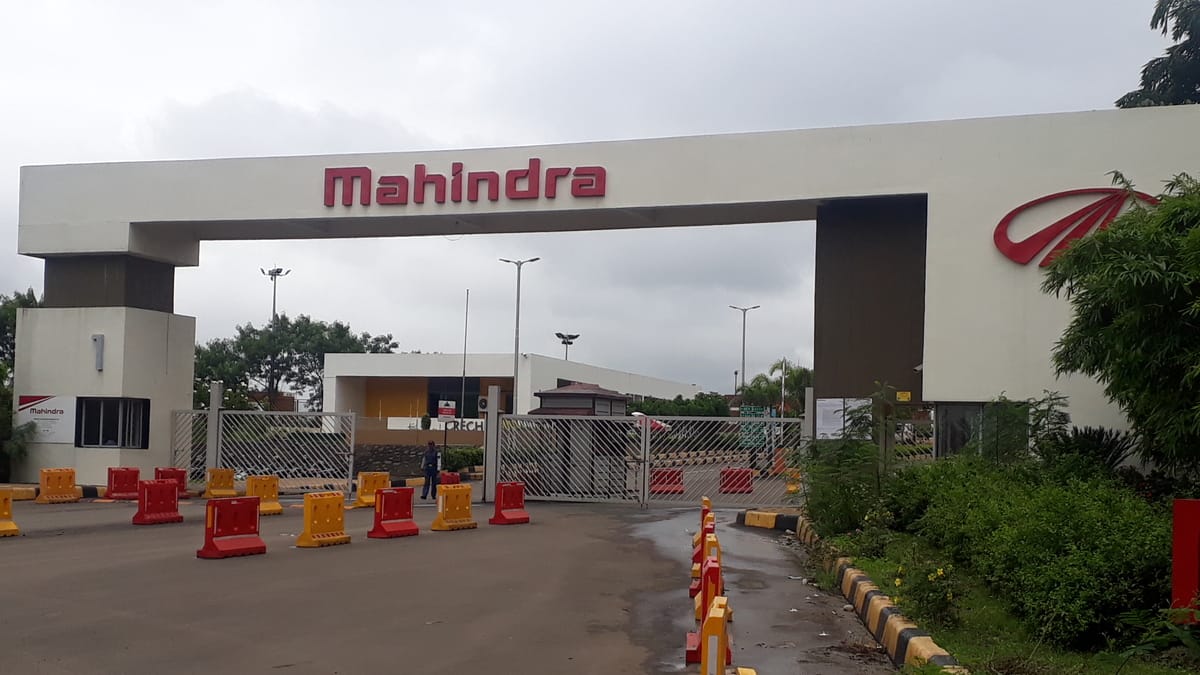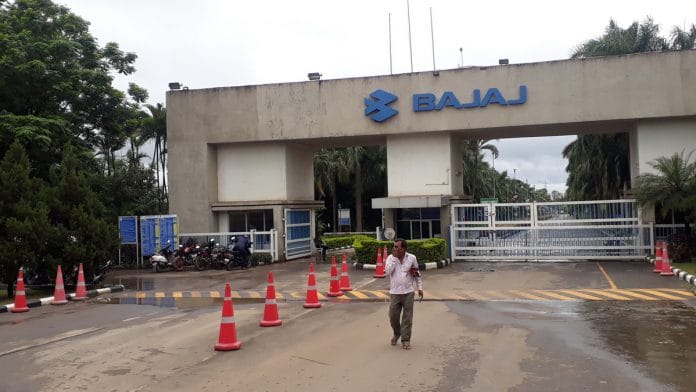Pune: Shah Rukh Shaikh, who lives in Bhosari, Pune, lost his job with an automobile company in the Chakan industrial area on the outskirts of the district about two months ago.
His family runs a makeshift paan shop at the Bhosari market, and his mother, who usually runs the shop, offered to step aside so he could work instead.
But Shaikh, a BTech graduate, doesn’t want to be at the shop. He is optimistic, even certain, about getting another job where he can use his engineering acumen.
“My company did not renew my contract citing a decrease in production. But there are many other automobile companies here and I was sure that I will get hired by at least one of them,” he told ThePrint. “But I approached at least 60 companies and none of them was ready to hire me. There is a ‘slowdown’, they all said.”
Shaikh now sits at the ‘paan tapri (vend)’, pasting lime on betel leaves and selling beedis and cigarettes. He said there were at least 350 other contract workers who had been laid off by the company, which he declined to name.
Also Read: Truck drivers to contract engineers, lakhs are jobless in Gurgaon-Manesar auto hub
Wheels of growth slow down
India’s auto sector is struggling with a prolonged slowdown, with vehicle sales for July seeing their sharpest drop in nearly two decades, forcing automobile manufacturers to cut production, shut factories and lay off workers.
According to the Society of Indian Automobile Manufacturers (SIAM), a body representing vehicle and engine manufacturers, almost 15,000 temporary workers in the industry have lost jobs.
Industry body Automotive Components Manufacturers Association of India (ACMA) estimates that production has been cut by up to 15-20 per cent by manufacturers, adversely impacting component manufacturers that could potentially lead to 10 lakh job losses.
Nearly 3 lakh others have lost jobs due to auto dealerships shutting down, because of falling demand, piling inventory and reduced financing, according to estimates of the Federation of Automobile Dealers Associations.
The situation in the Pune automobile hub, comprising areas of Pune, Pimpri Chinchwad, Talegaon and Chakan, and known to be one of the country’s largest, is representative of this overall slowdown.

The Pune auto hub
According to a report by the Maharashtra Industrial Development Corporation (MIDC), the state government’s infrastructure development agency, Maharashtra accounts for 35.1 per cent of the country’s total automobile output by value.
The auto sector in Maharashtra boomed between 2009 and 2013, with a compound annual growth rate of 21.08 per cent.
Within Maharashtra, the MIDC report stated, Pune is the most prominent auto centre, with more than 4,000 manufacturing and ancillary units in the Pimpri Chinchwad area alone.
Auto sector giants such as Tata Motors, Mahindra & Mahindra, Bajaj Auto, Volkswagen, Jaguar Land Rover, Hyundai and General Electric have units here. ThePrint reached these companies for comment, but there was no response.
A report in The Hindu Frontline this week said Tata Motors had to shut its Pune plant for three days due to an imbalance in production and demand. Talking about the situation, Arvind Goel of Tata Motors said, “With an alarming 30 per cent drop in the overall sales of vehicles across platforms, we are struggling.”
Tushar Survade, 22, who recently got a degree in mechanical engineering as well as a diploma, came to Pune from Jalgaon in north Maharashtra with four of his classmates, hoping to work in the city’s “glamorous” automobile sector.
Survade wanted to move out of the family profession, agriculture, and get a stable job that could earn him at least Rs 20,000 a month.
“But many companies refused to even accept our resume, saying they were reducing their staff strength due to the slowdown,” said Survade, roaming gate to gate at the Chakan automobile belt with his resume in hand.

Abhay Bhor, president of the Forum of Small Scale Industries Association, a body representing small units manufacturing material for auto parts in Pune and Pimpri Chinchwad, said there had been a 50 per cent drop in the demand for their products.
“Moreover, complicated rules under the goods and services tax (GST) regime have created panic among small businesses. They (auto manufacturers) have become extra-cautious in even relatively small decisions,” said Bhor, who runs a small eponymous unit that manufactures rubber.
However, Rajiv Bajaj, managing director of Bajaj Auto, has strongly opposed the view that the current slowdown has anything to do with the high GST rate, saying it was because of “overproduction and stocking”.
“Nobody knows how long this will last, but it certainly doesn’t deserve a GST cut,” he was quoted as saying in The Economic Times. “There’s no industry that keeps growing forever without correction… The answer lies in being global so that the company doesn’t fall sick if one market catches flu,” he was quoted as saying Wednesday.
Also Read: Slowdown is choking Tamil Nadu auto hub, but talking about it can get workers fired
‘No official figures, temporary workers first to go’
Ajit Abhyankar, a leader of the Centre of Indian Trade Unions (CITU), a workers’ union affiliated to the Communist Party of India (Marxist), said “about 70,000 temporary and contract workers employed in the core automobile, ancillary and related industries in Pune may have lost their jobs over the last three months months… although there is no accurate data available”.
Abhyankar said permanent employees comprised only about 25 to 30 per cent of the total workforce of automobile companies, while the majority were hired directly on a temporary basis or through third-party contractors.
“The temporary workers are the first to face the heat of a slowdown. Then the contract workers lose work. The permanent employees have not been affected much yet except for an increase in the frequency of ‘block closures (forced leave)’,” Abhyankar added.
Vijay Dhondge, who heads a workers’ union at a Chakan-based company that provides air conditioning pipes for automobiles, said the company had scaled down production by 75 per cent, from about 12,000 pipes a day a few months ago to 3,000 now.
“In the last two months, the services of 100 out of 200 contract workers were discontinued,” Dhondge said.
Many automobile dealerships that ThePrint visited in and around Pune reported a decrease of 30 to 40 per cent in sales over the last two-three months.

Prashant Girbane, director general of the Mahratta Chamber of Commerce, Industries and Agriculture, Pune, said the slowdown was the result of several factors coming together, besides the general economic stagnation.
“The announcement regarding early implementation of Bharat Stage-VI (BS-VI) norms may have prompted consumers to postpone their plans to purchase new vehicles,” he added.
“The crisis in Non Banking Finance Corporations since last year has impacted demand from rural areas. The introduction of e-vehicles, an increase in the insurance cost and registration cost — all these factors have collectively created an atmosphere of confusion among consumers and the industry.”
Different victims
Meanwhile, the slowdown continues to make itself felt in different ways.
Besides those laid off are people like Kalpana Kalukar, who lives and runs a small canteen in Chakan.
“Most of my customers were contract workers in the automobile companies here. Until about two months ago, I dished out 70 rice plates every day for lunch,” she said. “Now, I barely sell 10 to 20.”
Kanukar’s canteen employs six immigrants from Rajasthan who used to send most of their wages back home. As the number of lunch plates dropped, so did their money orders back home.
Also Read: Modi govt’s blanket ban on plastics at this moment of economic slowdown is a bad idea
Rushikesh Gawade is a freelance journalist based in Pune







It is an impact of Reservation, we should have reservation in ARMY too which will less knowledgeable (reserved) INDIANS to get the jobs in USA, Canada, etc…
Hahaha…..These marathi are just like that ..they do not use there mind
Bhai Software company me interview de daal nahi to ekhada international ya domestic bpo join kar abhi electric vehicles ka jamana hai .
sarkar jyda purane vehicle band kar rahi hai,toh log kharidenge kyu,aur sahi baat hai humne itna gandh machaya hai ,ki hadd ho gayi ghar ke bahar 20 feet pe jana ,aur utne ke liye bhi gadi chahiye.
chalo koi baat nahi best of luck.
In the 1970’s when the Aerospace industry collapsed in America, PhD Aeronautical engineers were driving cabs to put food on the table. That is free enterprise system. If India selected to have capitalistic economy, periodic unemployment is almost inevitable. An average American has 7 jobs in his 35 years career,
Brings back fond memories from 1968. Father had been transferred from Delhi to Poona. For a week we stayed at the guest house of Hindustan Antibiotics in the Pimpri – Chinchwad Industrial Area. Each factory had a beautiful garden / well laid out lawn, I don’t think a single unit was sick. During his tenure, father would sometimes request Shri Rahul Bajaj to allot a scooter from the manufacturers’ discretionary quota to one of his junior colleagues. The normal waiting period was ten years. Mr Bajaj later said he was willing to go to jail for producing more than his licensed capacity.